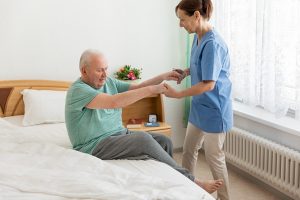
Bed sores can be very painful and potentially dangerous.
Bed sores affect nearly one in every ten seniors, and are even more prevalent in people who smoke, are living with a chronic illness like diabetes, or who have thin or fragile skin. Also known as pressure sores or pressure injuries, bed sores are not merely extremely painful – they can easily progress to infections that can become life-threatening.
Bed sores are the result of too little blood flow when remaining in one place for an extended period of time. For people with limited mobility or who are bed- or wheelchair-bound, the battle against bed sores can seem never ending. Still, it is imperative for those caring for a senior loved one to learn about bed sore prevention. These tips can help protect your loved one’s vulnerable skin from painful and dangerous sores:
Change Positions Frequently
- Help the senior change position every couple of hours if bedbound or hourly if wheelchair-bound.
- Use lifting devices to prevent friction during repositioning.
Utilize Supportive Devices
- Place specialized cushions and pads:
- Under calves to guard heels
- Between knees and ankles
- To lie at an angle, protecting hips
Practice Skin Care
- Clean the skin with a mild soap and warm water and apply lotion.
- If the skin is excessively moist, apply talcum powder.
- Massage areas susceptible to pressure sores to improve circulation.
Eat Well and Stay Active
- Consult with your loved one’s doctor for dietary and supplement tips for optimum skin health.
- Quit smoking.
- Maintain good hydration.
- Exercise daily per doctor’s recommendations.
If your senior loved one develops a bed sore despite taking the proper precautions, it will progress through the following four stages:
- Stage 1: A bruise-like patch will form on the skin which may be warmer compared to surrounding skin. The area might itch or burn.
- Stage 2: An open sore appears from the bruise. This may look like a blister or abrasion and be discolored and painful.
- Stage 3: As the sore gets worse, the surrounding skin darkens and the area is deepened.
- Stage 4: During this stage, damage occurs to the bone, muscle and/or joints, and a bone infection known as osteomyelitis or even sepsis (a life-threatening blood infection) may occur.
Contact your loved one’s physician immediately if a bed sore appears. Advanced Home Health Care, a leading provider of home care and memory care in Mt. Pleasant and the surrounding areas, can also help by performing daily skin inspections to help spot vulnerable regions of the skin and detect the early signs and symptoms of pressure sores. Our team can also help with walking, position changes, and transferring to reduce the risk of developing bed sores. Our professional home health care services and care team are just a phone call away. Contact us today at 800.791.7785.

